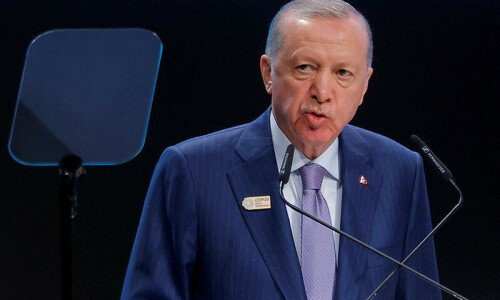Desperation, chemical imbalance or just plain old mischief, Faf Du Plessis has joined the ranks of the notorious few who have given the International Cricket Council (ICC) some more technicalities to ponder over while bringing shame to their country.
Before the two-Test series started South Africa stood to gain little but lose a bit more. That’s how the rankings work. If it were to win both the Tests, it would've gained just one rating point, lost as many as four ratings points if the series ended in a draw, eight points in case of a 0-1 defeat and 10 points if Pakistan won both the Tests. The old adage about “just competing” is, quite simply, very old now.
Du Plessis' moment of brilliance was perhaps borne out of a desire for his side to not lose any ground on their number-one status but it was a little surprising considering South Africa’s position in the second Test against Pakistan in Dubai was never in any doubt. In fact, the superiority had been established on the first day when Pakistan, fresh from pinning their opponents days ago, had succumbed to their characteristic recklessness.
It was shocking that Du Plessis felt the need to indulge the ball with the zip on his trousers because with Misbah-ul-Haq’s side clearly floored on day three, it seemed just a matter of time before the match would end in the favour of the Proteas. The player’s action and the purported video of another South African bowler scratching the ball has clearly taken the shine off the recent performances of Graeme Smith’s attack. If they can do it once who’s to say they haven’t done it on a few more occasions as well?
What’s more appalling than the actions of Du Plessis is the judgment of match referee David Boon, who has only fined the South African 50% of his match fee before adding: “I am also satisfied that this was not part of a deliberate and/or prolonged attempt to unfairly manipulate the condition of the ball, and that the imposition of a fine of 50 per cent of his match fee is appropriate considering the circumstances.” That’s like the on-field umpire saying: “Well the bowler stepped over the line there but I’ll just warn him and not call a no-ball.” Boon’s “52 not out” clearly seems to have clouded his decision-making.
Perhaps the ICC knows best and has employed the right man in Boon but the fact that Saeed Ajmal was officially reprimanded for ‘celebrating’ a little bit too much after taking a wicket on the same day, risks evoking memories of the very ugly Mike Denness racism affair of 2001 in the minds of Pakistani fans.
By Agencies
Following is a list of major ball-tampering incidents in international cricket in the wake of South Africa being penalised five runs during the second Test against Pakistan in Dubai on Friday for attempting to alter the state of the ball:
In 1974, Bowler John Lever was accused by India of using vaseline to get unnatural shine on the ball as England dominated the away series. The tourists said the pace attack were troubled by sweat running into their eyes and stuck gauze containing vaseline on their foreheads.
In 1990, New Zealand worked on the ball with a bottle top during the third Test against Pakistan in Faisalabad, said wicketkeeper-batsman Adam Parore several years later. It made for some prodigious late swing and helped seamer Chris Pringle take an 11-wicket haul.
In 1994, caught rubbing loose soil from his pocket on to the ball during the Lord's Test against South Africa in 1994, England captain Michael Atherton said it was merely to help dry his hands. But he was fined and British newspapers hollered unsuccessfully for him to resign.
In 2000, Pakistan paceman Waqar Younis was the first player suspended for ball-tampering at a triangular one-day international series in Sri Lanka. He was found to have gouged the side of the ball with his thumb nail. He was also fined 50 % of his match fee. Moreover, Azhar Mahmood was also accused of altering the state of the ball and fined 30 % of his match fee.
In 2001, Sachin Tendulkar was suspended for one match after being accused of scuffing the seam of the ball during the second Test against South Africa in Port Elizabeth.
In late 2002, Shoaib Akhtar was accused of tampering with the ball during a Test match in Zimbabwe.
In 2003, Shoaib Akhtar was fined 75% of his match fee and banned for two one-day internationals for ball-tampering during Pakistan's 22-run victory over New Zealand.
In 2004, Rahul Dravid was fined 50% of his match fee, after being found guilty of ball-tampering during India's 24-run victory over Zimbabwe at Brisbane.
In 2006, Australian umpire Darrell Hair, together with colleague Billy Doctrove of West Indies, docked Pakistan five runs for ball-tampering during a controversial Test against England. Pakistan refused to take the field at The Oval and forfeited the match in protest. The row cost Hair his career as a senior international umpire.
In 2006, Shoaib Akhtar was filmed by Sky cameras flicking at the ball with his thumb during a one-day international here against England.
In 2010, England bowlers Stuart Broad and James Anderson were accused of deliberately standing on the ball with their spikes during a Test against South Africa. No charges were formally laid and Broad said he was just being lazy in trying to stop the ball. According to former England captain Michael Vaughan, Broad had “been stopping the ball with his boot all the way through this series.” He added: They were lucky to get away without an official reprimand, or even a ban, because there is no doubt in my mind that they were trying to change the condition of the ball.
In 2010, Stand-in Pakistan captain Shahid Afridi tried to bite the ball during the fifth ODI against Australia in Perth. The third umpire spotted him and ordered the ball to be replaced. Afridi was banned for two matches.
In 2010, Shoaib Akhtar could be seen apparently running his left thumb along the ball's seam before dropping the ball on the ground and standing on it with his spiked right boot.
In 2012, Australia seamer Peter Siddle was cleared after being accused by Sri Lanka of attempting to raise the seam during a Test.
In 2013, Former England captain Bob Willis accused his fellow countrymen of ball-tampering during the Champions Trophy but the players vehemently denied the suggestion.
In 2013, Faf du Plessis of South Africa was caught on camera rubbing the ball on a zip on the side of his trousers and subsequently fined 50% of his match fee. South Africa also became only the second team after Pakistan to be penalised five runs for ball-tampering.












































